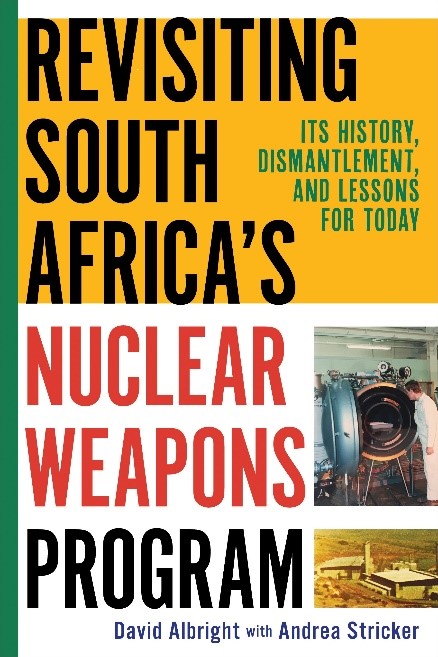Latest Reports
Memo on Reported Destruction of Secret Workshop in 2020
by David Albright, Sarah Burkhard, Spencer Faragasso, and Mohammadreza Giveh
April 2, 2024
On March 24, 2024, Iran International reported that an “industrial production workshop […] belonging to the Atomic Energy Organization of Iran (AEOI) was deliberately set on fire” in the summer of 2020. 1 The incident was not reported publicly at the time, and Iran International cites judicial and intelligence documents provided by a hacking group as their source. According to Iran International’s analysis of the documents, Iran alleges that the Israeli intelligence service, Mossad, hired a group of nine Iranians, provided them with a “blueprint of the Shadabad workshop,” and offered payment if the group “set the workshop on fire, destroyed the property, and filmed it.” The workshop is described in the report as “a covert workshop” in the Shadabad neighborhood of Tehran which Iran “had not disclosed to the International Atomic Energy Agency (IAEA).” Its destruction attracted the attention of Supreme Leader Ali Khamenei, who called for the severe punishment of the perpetrators.
The exact purpose of the workshop is difficult to determine from the available information, but the general area is known to have workshops that were involved in making prototype re-entry vehicles for missiles under the Amad Plan. 2 Two of these workshops were visited by the IAEA in 2015.
Based on the available information, there are multiple possibilities regarding the purpose of the workshop to consider, including:
An Iranian Revolutionary Guard Corps (IRGC) workshop or contractor that makes important military-related components, such as missile re-entry vehicle prototypes;
An AEOI facility, purpose unknown; or
A workshop involved in advanced centrifuge research and development (R&D) and/or component manufacturing/assembly under the AEOI or the IRGC.
The site was destroyed shortly after a major attack on the AEOI’s advanced centrifuge assembly facility at the Natanz site. 3 Several months later the “father” of Iran’s nuclear weapons program and head of SPND, Mohsen Fakhrizadeh, was killed in an ambush attributed to Israel. 4
Involvement of Rastin Khadamat Parsian Co
According to a letter revealed by Iran International in its Farsi language report, claimed to be from Iran’s Ministry of Intelligence and Security (MOIS), a person named “Hassan Imani Nasaz,” who works for Rastin Khadamat Parsian Co., was approached two days before the incident by “people on a motorcycle” asking him about the workshop. Rastin Khadamat Parsian (also known as Rastin Khadamat) was established in 2012 with the purpose of supporting operations at various AEOI facilities. It is related to the AEOI’s Energy Novin Co. and is subject to secondary sanctions by the U.S. government. 5, 6 The fact that the people who likely were intruders or somehow related to them contacted a Rastin Khadamat employee to inquire about the Shadabad workshop is an indication of the company’s involvement with the workshop. But what was the company’s role?
According to the company’s founding statement, its area of work involves the “provision of all contractual projects” and “general authorized services” such as building maintenance, administrative services, catering, and conducting authorized domestic and foreign trade operations. 7
Further, in another set of hacked documents, we found a presentation and a board of directors’ meeting minutes indicating that Rastin Khadamat had been involved in building maintenance and security provision at the Bushehr nuclear power reactor. 8 A spreadsheet related to the company’s employees at the Darkhovin nuclear power plant site was also found in this set.
Overall, provision of maintenance services or security would explain why a Rastin Khadamat employee was knowledgeable about the workshop, but it does not necessarily provide more clues about the operations inside the workshop.
Operations Inside the Workshop
A reason to believe that Iran was conducting centrifuge related activity in Shadabad is that in another letter revealed by Iran International, the courthouse investigator asked MOIS to question people about the incident. Among them were Amir Moayyed Alai and Morteza Ahmadali Behzad, who were linked to AEOI’s centrifuge production and enrichment activities in the past. Alai and Behzad both received a third-degree medal of honor from Mahmoud Ahmadinejad, the Islamic Republic’s president at the time. Alai received his for the operation of a 164-machine centrifuge cascade while as the director of assembly and engineering at Natanz, and Behzad for his service as the CEO of Iran’s Centrifuge Technology Co. (better known as TESA more recently). 9 Behzad was sanctioned by the United States for his role as the Managing Director and Deputy Chairman of the Iran Enrichment Company in 2012. According to the sanctions listing, Behzad was “a scientist with a specialization in the manufacture and testing of centrifuges” and held “various positions at AEOI’s subordinate and front companies.” 10
At the time of the 2020 incident, Alai was the CEO at Andisheh Sazan Salamat Parsian Co. (PHEDCO) 11 which is active in the design, production, and procurement of industrial centrifuges for health and oil industries. 12 Masood Esmkhani, a third person that was questioned about the incident, was the Head of Board of Directors at the same company.
Exact Location of the Workshop
One of the leaked documents briefly shown in Iran International’s video report specifies the date of the incident as July 28, 2020. This date corresponds to available archival data from the NASA Fire Information for Resource Management System (FIRMS) database, which tracks active fires via satellite. FIRMS recorded an active fire within the Shadabad vicinity during that time frame, although it shows a location south of the expressway, while the Shadabad neighborhood’s boundaries are north of the expressway. 13 The exact location cannot be derived from either the Iran International report or the FIRMS database, and if the fire occurred primarily on the inside of the facility, the NASA satellites may not have picked it up. A review of satellite imagery from August 18, 2020, did not reveal any buildings with visible external evidence of a fire in the vicinity of Shadabad.
Interestingly, the state media published a documentary about a year and a half after the event, called “Nafas Kesh,” telling the story of thugs destroying a “ventilator production” workshop amid the COVID-19 pandemic per Israeli direction and deception. The details of the incident, including the names Masoud, Behrouz, Peyman, Mohammad, and Hoissein match the Iran International report, with the exception of the purpose of the facility. The documentary includes some alleged footage of what seems to be the intruders going back to the scene of the crime and some CCTV recordings of the incident (see Figure 1 below).
Observations
The exact purpose of the workshop could not be identified, although gas centrifuge work by organizations or personnel linked to the AEOI seems the leading choice from the currently available information. The reason for the site being so secret, however, could not be determined. It cannot be ignored that someone, reportedly Israel, wanted it destroyed and that top-level Iranians took an interest in the case, consistent with something important, possibly centrifuge-related, being stored or happening at the site.
Was the site part of a parallel, secret centrifuge effort, a practice followed by Iran in the 1990s and early 2000s when both the AEOI and the IRGC had centrifuge programs? 14 If the workshop was indeed involved in centrifuge R&D or component manufacturing or assembly, in particular if it was involved in the manufacturing or assembly of rotor tubes or bellows, or their assembly into rotor assemblies, it should have been declared under monitoring provisions of the Additional Protocol and/or the Joint Comprehensive Plan of Action (JCPOA), which Iran was officially still fully implementing at the time.
Whatever the truth about this site, it warrants further scrutiny.
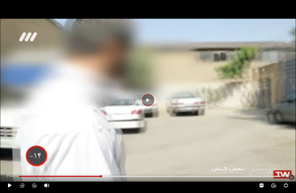
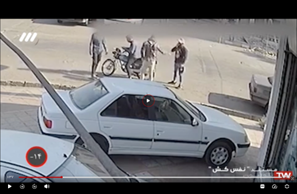
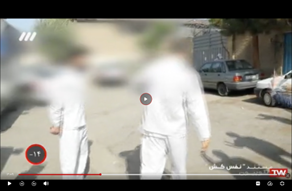
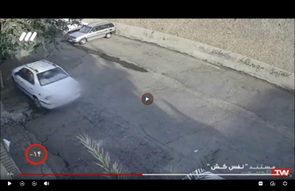
Figure 1. Screenshots from a documentary allegedly showing CCTV footage of the incident. (https://telewebion.com/episode/0x1bdfe01)
1. Masoud Kazemi, “How A Secret Atomic Workshop In Iran Went Up In Flames,” Iran International, March 24, 2024, https://content.iranintl.com/how-a-secret-atomic-workshop-in-iran-went-up-in-flames/index.html. ↩
2. David Albright with Sarah Burkhard and the Good ISIS Team, “Iran’s Perilous Pursuit of Nuclear Weapons,” Institute for Science and International Security, May 2021, https://isis-online.org/books/detail/irans-perilous-pursuit-of-nuclear-weapons. ↩
3. David Albright, Sarah Burkhard, and Frank Pabian, “Damage to the Iran Centrifuge Assembly Center (ICAC) at Natanz Is Far More Severe and Extensive Than Previously Reported,” Institute for Science and International Security, July 8, 2020, https://isis-online.org/isis-reports/detail/damage-to-the-iran-centrifuge-assembly-center-icac-at-natanz/8. ↩
4. Iran’s Perilous Pursuit of Nuclear Weapons. ↩
5. Founding Statement of Rastin Khadamat Parsian Co., Public Company Registry RASM, [Translated from Farsi], https://rasm.io/person/24F0D85/%D8%B3%DB%8C%D8%B1%D9%88%D8%B3%20%D9%85%D8%AA%DB%8C%D9%86%20%D8%B1%D8%B2%D9%85/AMP/. ↩
6. U.S. Department of the Treasury, “Publication of Updates to OFAC’s Specially Designated Nationals and Blocked Persons List and 13599 List Removals,” Press Release, December 5, 2018,https://ofac.treasury.gov/recent-actions/20181105_names. ↩
7. Public Company Registry RASM, [Translated from Farsi].↩
8. The documents are reportedly from a hacker group called Black Reward, which leaked the documents in October 2022. They accessed documents of Iran’s Nuclear Power Production and Development Company.↩
9. “The president honored some of the country’s nuclear elites by awarding state medals,” [Translated from Farsi], IRNA, August 27, 2006, رییس جمهوری با اعطای نشان دولتی از برخی نخبگان هسته ای کشور تقدیر کرد - ایرنا ↩
10. U.S. Department of State, “Increasing Sanctions Against Iranian Nuclear Proliferation Networks Joint Treasury and State Department Actions Target Iran’s Nuclear Enrichment and Proliferation Program,” Press Statement, December 13, 2012, https://2009-2017.state.gov/r/pa/prs/ps/2012/12/202023.htm. ↩
11. “Andisheh Sazan Salamat Parsian Co.”, Public Company Registry RASM, [Translated from Farsi], https://rasm.io/company/14004527585/%D8%A7%D9%86%D8%AF%DB%8C%D8%B4%D9%87%20%D8%B3%D8%A7%D8%B2%D8%A7%D9%86%20%D8%B3%D9%84%D8%A7%D9%85%D8%AA%20%D9%BE%D8%A7%D8%B1%D8%B3%DB%8C%D8%A7%D9%86/#persons. ↩
12. Iran Phedco Company Website [Translated from Farsi], https://www.iranphedco.com/fa/about-PHEDCO. Based on looking at the company’s web site, the company’s centrifuge work could not be directly linked to any AEOI gas centrifuge uranium enrichment efforts.↩
13. “Fire Information for Resource Management System Timeline,” National Aeronautics and Space Administration, July 28, 2020, https://firms.modaps.eosdis.nasa.gov/map/#d:2020-07-28;@51.30,35.63,14.00z. ↩
14. Iran’s Perilous Pursuit of Nuclear Weapons.↩
 twitter
twitter